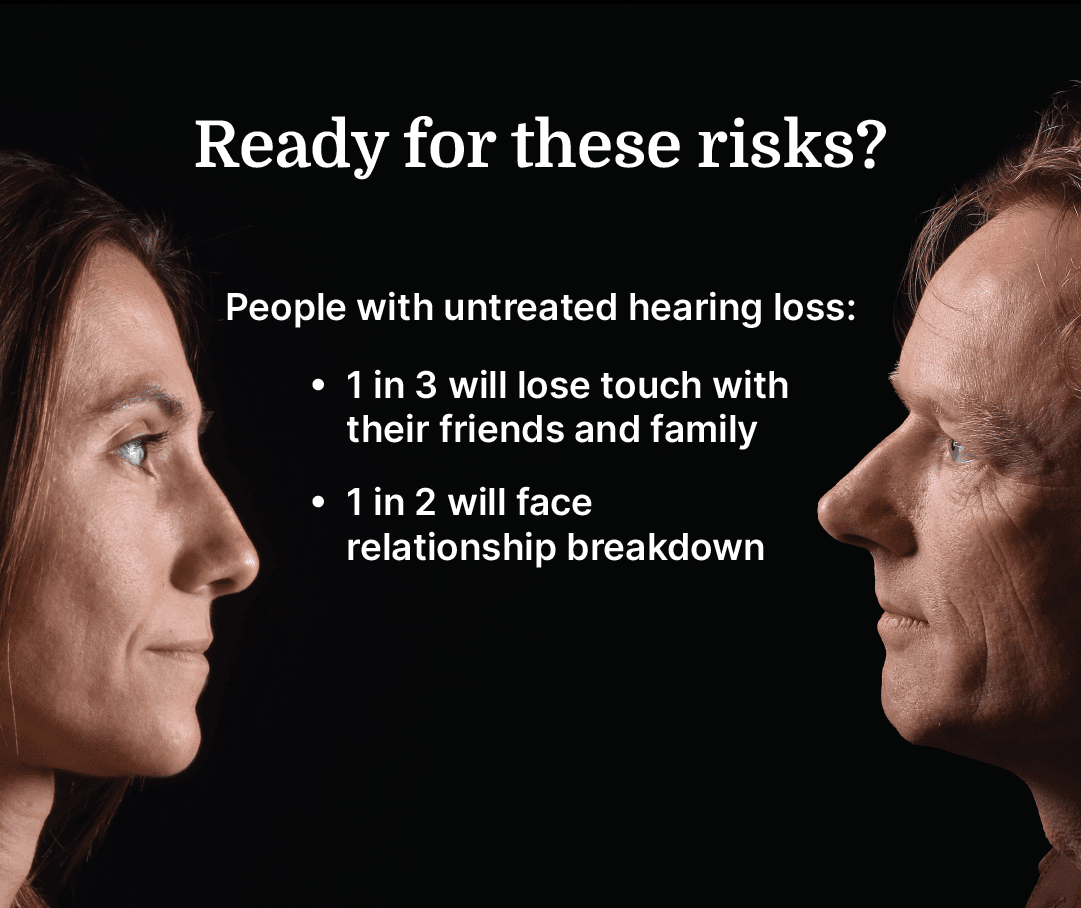If you know someone with hearing loss, and you see how their life happens around them, it’s not a big stretch to accept untreated hearing loss impacts close relationships – especially partner or spousal relationships.
The emotions the person with hearing loss experiences – aggravation, frustration, worry, anxiety, conflict – cascade onto and into those in the closest relationships.
If you have hearing loss, and you’re ignoring it, it’s important to know you aren’t alone in this journey. Your decisions impact those closest to you and you risk relationship breakdown. Hearing loss is a shared experience, and not in a good way.
And if you’re the partner or spouse of someone with hearing loss that they’ve left untreated, you need to know you’re not alone either.
Relationship stress and breakdown
Detailed studies have taken place all over the world looking at the effect of hearing loss on the people closest to someone with hearing loss. These ‘communication partners’ include spouses, caregivers, children and best friends.
Of course, there are the things like having to repeat yourself or shouting to be heard. These can be frustrating or aggravating, both for the person asking for the repetition and the person having to do it. The shouting can be irritating for everyone in the immediate area, especially when in a public place.
Just those two things – repetition and shouting – can change relationships.
The quality of life for the person with hearing loss is impacted, no question, by increasingly poor hearing. The communication partners’ quality of life changes too. Communication partners often have a restricted social life due to both their having to take on the burden of communication in social gatherings and the person with hearing loss choosing not to go to social activities.

Spouses’ and partners’ 3rd party disability
As a result of all the research, the World Health Organization recognizes being a spouse or partner of a person with untreated hearing loss as a 3rd party disability.
There’s a cascade effect created by the person with hearing loss that is experienced more greatly by the spouse or partner. Feelings of social isolation, embarrassment and frustration felt by the person with hearing loss are carried over to the partner or spouse.
The emotional consequences of leaving hearing loss untreated are profound for the spouse or partner, as much or more than it is for the person experiencing hearing loss. For many partners, the additional effort of navigating the world and mediating for the partner with hearing loss is tiring – making sure the partner with hearing loss is protected from embarrassment or judgement.
Decreased quality of life across the board
Studies have shown having a spouse or partner with untreated hearing loss impacts almost every aspect of life. Everyday conversations are a challenge; finding agreement in decisions is frustrating as the person with hearing loss misses so much of the conversation. Relationship satisfaction deteriorates.
Surprisingly, there’s often a disconnect in the impacts of the hearing loss between the partners in the relationship. In many relationships, the person with hearing loss dismisses their challenges and feels they’re managing just fine whereas their partner sees and feels the actual ‘you’re not managing just fine’.
How does it affect those closest to you?
The following table outlines some of the ways partners and spouses, best friends and caregivers are impacted by untreated hearing loss.
| What’s being affected? | How is it affected? |
| Communication |
|
| The relationship |
|
| Social situations |
|
The bottom line
The research has shown nearly half the people with untreated hearing loss will experience relationship breakdown and 1-in-3 people will lose touch with family and friends.
Partners and spouses expect the person with hearing loss to do something about it. When those with hearing loss accept they need treatment and take responsibility for the impacts on their relationship, there are increased levels of happiness in the relationship.
Some tips on talking about hearing loss with your communication partner (PDF).
Sources:
Kamil RJ, Lin FR. The effects of hearing impairment in older adults on communication partners: a systematic review. J Am Acad Audiol. 2015 Feb;26(2):155-82. doi: 10.3766/jaaa.26.2.6. PMID: 25690776.
Melissa Echalier. In it together: The impact of hearing loss on personal relationships.
Anderson, D.l. and Noble, W. Couples attributions about behaviours modulated by hearing impairments: Links with relationship satisfaction. Int J Audiol. 2005 Apr.
Scarinci N, Worrall L, Hickson L. The effect of hearing impairment in older people on the spouse. Int J Audiol. 2008 Mar;47(3):141-51. doi: 10.1080/14992020701689696. PMID: 18307094.
Bridget Shield, Hearing Loss – Numbers and Costs, Evaluation of the Social and Economic Costs of Hearing Impairment. A report for Hear-It AISBL. 2019

